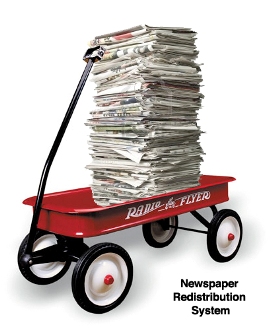I have a confession to make. I'm a content crook. A newspaper thief.
I'm pretty sure that Rupert Murdoch would say I stole intellectual property.
I started at a very young age.
I was nine years old, and as a young man, I always seemed to want to be an entrepreneur. I remember clear as day the first time I noticed all that valuable content just sitting there. Waiting to be re-purposed. It was pure gold - and no one seemed to see it but me.
Up and down my suburban street, piles and piles of almost brand new newspapers.
I knew they were valuable, because my mom and dad read them eagerly each day. On Sundays they were part of a family tradition that included bagels and lox. Newspapers were gold, and these were stacked in neat crisp piles.
Now, I understood that they weren't worth the full price. They were a day old. But they couldn't be worth nothing. Surely someone would be willing to buy day-old newspapers at a discount!
And so, I set off, with a red wagon and a dream to be the neighborhood's best-known proprietor of day-old newspapers. "Extra, extra, read all about it. Get your day-old news here!" I chirped as I went from door to door.
Now, selling newspapers isn't easy. And selling newspapers that are slightly used turned out to be a bit of a challenge. But sure enough, I sold a few. And found that there was some value left between those pages.
My work as a used-newspaper salesboy didn't last for long, as I found more lucrative employment selling polished stones ("Hot Rocks") and then performing as a magician at local birthday parties and Elks clubs.
But I was reminded of my Used-News experiment the other day. The debate over "free vs. paid" news distribution continues to create a dividing line between conventional printed news distribution and today's digital Web delivery.
A few questions I found myself pondering: was I stealing news when I resold the newspapers left by the sidewalk? Did the owner of that newspaper have the right to give me the right to re-sell it? Back then, the paper was Long Island's Newsday. Today, it's owned by the cable giant Cablevision.
But had Newsday known I was selling day old news, would they have cared back then? Certainly they'd say that I was profiting from their hard work, and it's true. I think I made almost five dollars a week.
Back then, a newspaper was a product. A physical thing. But today the news is digital. It moves at lightning speed and is delivered to my desktop computer almost instantly.
What if I were, as a nine year old boy, to embark on my used-news project on the Web today? It would, I suspect, look a lot like The Huffington Post. News, gathered and organized and re-sold. Did I add value back when I was dragging my red wagon around? Hard to say. I did bring my used-news to my neighbor's door - so that was helpful. But if I was doing that today, I suspect I'd do more, I'd select news from various sources, I'd filter, sort and curate my take on the links of the day. And in the end, sure, I'd charge something for my re-purposed news service.
Mr. Murdoch would call that theft. Mark Cuban, another outspoken critic of Aggregation, would call me a vampire. And I think I'd argue today as I did back on Ward Street, that gathering up things that are set out on the sidewalk for all to see and adding value and delivering them to a new customer is me participating in the democracy that is both free speech and news gathering and re-distribution.
I know nine-year-olds see the world in a pretty simplistic way, but the more time I think about my used-news endeavor, the more I think both my neighbors and I got it right.
If anything, my business was way ahead of its time.
Today, we need more context and organization around information. So if that means more nine-year-olds are cutting and pasting the New York Post or the Wall Street Journal - well, to me that's something that can only lead to good things for readers and media barons alike.
Originally Published on MediaBizBloggers
